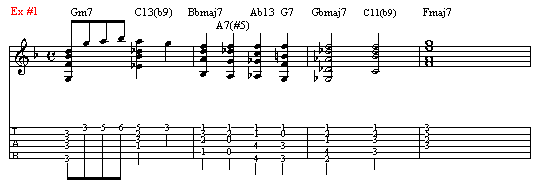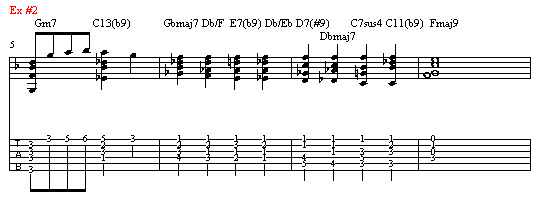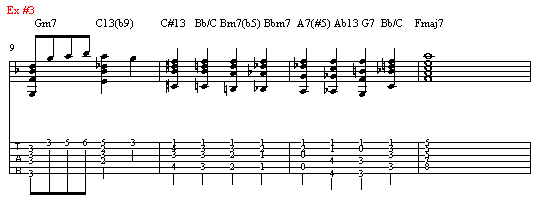Part One: Melody
Focuses on single note soloing. Learn how to effortlessly solo through complex chord changes.
Free Jazz Guitar Lessons with Chris Standring
Intros and endings are very important when playing jazz standards because
it will show the listener that you have thought about some kind of arrangement,
rather than counting off a tune and blowing through it, only to stagger
at the end and almost cause a train wreck.
Endings are especially important when accompanying singers as you can
design the "big finish". One popular and very successful way
to approach the end of a song is by landing on the tonic note and harmonizing
a group of chords with the tonic note at the top of each, but without
stating the tonic chord until the very end. This way, you present an
interrupted phrase ending, some good tension and you can build up the
final resolution.
For the three examples on the left, I have begun example with a two
five cadence and then the interrupted reharmonized chords.
Ex 1: Starts the interrupted phrase with a Bbmaj7 chord and walks down
in half steps, all with the tonic note F on top of each chord. Start
this at the 6th fret
Ex2: Starts the interrupted phrase with a Gbmaj7 chord, a half step
up from the tonic (home key) chord (use root on the 5 string this time)
and walks down eventually landing on the dominant chord (C7sus4) and
then finally F, the tonic chord.
Ex 3: Starts on C#13, a half step up from the dominant of Fmajor and
walks down.
You may have noticed that all three of these examples walk down
and eventually get home to F. Try your own ideas and maybe walk up.
Lots of room for potential here. Have fun!



Free online jazz guitar lessons for beginners, intermediates and advanced.
Online jazz guitar instruction from recording artist Chris Standring
Join The Inside Track membership and get access to all Chris Standring's guitar instructional programs, all in one place.
It has been many years since the first edition of Play What You Hear (originally released in 2000). Now volume two is here with new ideas and concepts, complete with audio, video, traditional notation and TAB throughout. High resolution pdf available for printing the entire program. For intermediate and advanced players.
Focuses on single note soloing. Learn how to effortlessly solo through complex chord changes.
Focuses on chord melody. Learn new harmonic devices and understand chords in a whole new way.
Study Chris Standring's six recorded solos, transcribed with audio and high def video.
Copyright © PlayJazzGuitar.com - All Rights Reserved.